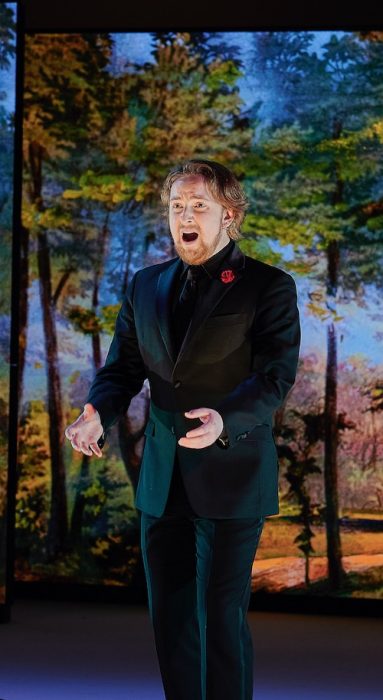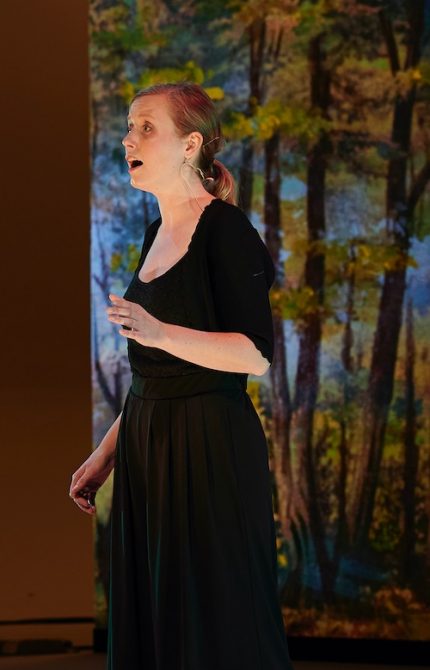Haymarket Opera goes to Hollywood, opening 10th season with a filmic “Acis and Galatea”

For opera lovers, the live-music shutdown due to Covid-19 has been the hardest musical absence to bear. One can unearth a few scattered chamber events to attend in person, and recordings will have to take the place of symphonic concert performances temporarily. But with a near-complete shutdown of opera companies across the country the inability to hear top voices singing great music in the flesh has the greatest arts loss for vocal aficionados.
Happily, smaller companies can be more nimble than larger houses and many are finding alternative ways to present opera in these fraught times for classical music.
Kudos to Haymarket Opera founder Craig Trompeter and general director Chase Hopkins for preserving the 10th anniversary season of Chicago’s hardy Baroque opera company. Haymarket’s all-Handel season opened Friday night with Acis and Galatea in the company’s filmed version, streamed online. The on-demand stream will be available through November 8.
As acclaimed as George Frideric Handel’s operas are in the 21st century, many of his greatest stage works received indifferent success in his lifetime.
Not so Acis and Galatea, which brought the composer the most boffo operatic box office of his long career. Over 70 performances took place after the premiere (c.1718) and Acis is one of the rare Handel works to be published in his lifetime (including a greatest hits edition of not only “Favorite Songs” but the overture, choruses and even recitatives).
The “Masque in Two Acts” is Handel’s second work on the same Greek myth, following his Italian cantata Aci, Galatea e Polifemo of a decade earlier. The mortal Acis falls in love with the sea-nymph Galatea who is also lusted after by the jealous cyclops Polyphemus. Hilarity doesn’t ensue as Polyphemus kills Acis; the devastated Galatea transforms her deceased lover into a river spring, “Murm’ring still his gentle love.”
Quaint as the scenario may be, Acis offers a remarkable wealth of musical riches in its 95-minute span even by Handel’s standard. There is a ceaseless flow of indelible melodies for the four principals and chorus, which rise over the drearier patches of the libretto.
Despite much hype about Haymarket’s “revolutionary” approach to filming a Handel opera, this streaming version of Acis and Galatea remains, essentially, a filmed concert performance—albeit with more stylish lighting and direction than most.
The company jettisoned its usual scrupulous attention to period sets and Baroque performance styles in favor of a more contemporary look, embracing the artifice of the studio setting. Singers wore modern concert attire and kept socially distanced as much as possible. There was zero attempt at stage drama or blocking, 18th century or otherwise. (Granted, having Polyphemus kill Acis with a hurled boulder would have been a challenge.)
Still while the video looked crisp and striking and voices projected clearly, this stylistic hybrid didn’t seem an entirely comfortable transition from the company’s usual historically informed bailiwick. The performance proceeded smoothly but with no interaction between the singers, there was often—perhaps inevitably—a lack of theatrical spark and spontaneity.
Less smooth was the technical side, with transmission dropouts starting at the halfway mark. These hiccups were brief but intermittent enough to be frustrating and occasionally interrupt the flow of the performance.
Fortunately, on the musical front, the singing was consistently stellar and served Handel’s delightful score superbly.

As Acis, Michael St. Peter continues to build on the strong impression the singer made last year with his company debut in The Dragon of Wantley. The young tenor possesses an easily produced light tenor, which along with his sunny persona, wholly conveyed the youthful sincerity and guileless innocence of Acis. St. Peter’s ardent “Love in her eyes sits playing” was ideally realized though it’s unfortunate that his “Love sounds th’alarm” was bedeviled by dropouts.
Kimberly Jones proved a vocally worthy Galatea, handling the roulades of “As when the dove” and her other arias with technical aplomb. What was lacking was a depth of expression that reflected her character’s emotions and dire predicament. Galatea’s final arias failed to touch the heart, anodyne vocally and let down by the soprano’s unsubtle acting.
Haymarket’s ever-reliable David Govertsen brought his imposing instrument and customary vocal excellence to the villainous role of Polyphemus. The singer seemed inhibited by the quasi-concert format and at times one wanted a bit more Owen Brannigan-like theatrical relish for the fantastical character. Still Govertsen sang marvelously, his dark saturnine bass-baritone deliciously nimble and exacting in the lilting “Oh, ruddier than the cherry.”
As the shepherd Damon, Kaitlin Foley provided the highlights of the performance. The soprano’s poised delicacy proved well suited to the shepherd—a kind of pastoral intervention counselor. Foley’s “Would you gain the tender creature?” was gorgeous as was “Consider, fond shepherd” (taken from the eliminated tiny role of Coridon).
The five-member chorus—soprano Foley, mezzo-soprano Mallory Harding, tenors Ryan Townsend Strand and Jianghai Ho and baritone Dorian McCall—provided ideal ensemble singing throughout. They opened the proceedings with a resplendent “Oh, the pleasure of the plains,” plumbed the tragedy of “Wretched lovers,” and floated a luminous coda in “Galatea, dry thy tears.”
Garry Grasinski’s video direction got off to a hectic start. In the opening Sinfonia the shots of the masked orchestra members induced motion sickness with needlessly fast and dizzying MTV-style editing, as if allowing an image to last more than three seconds might induce boredom. Fortunately, the direction settled down after that and served both the singers and Handel’s score well. Zuleyka V. Benitez’s attractive scenic panels nicely painted the Arcadian milieu and brought warmth to the chilly studio venue.
A couple stately tempos threatened to drag the pace at times, but for the most part Craig Trompeter led the ensemble with well-judged direction. Balances were impeccable, allowing the felicities of Handel’s scoring—piping recorders and melancholy oboes—to emerge in rich colors and with expressive detailing.
Handel’s Acis and Galatea is available online through November 8. Tickets are $25. haymarketopera.org